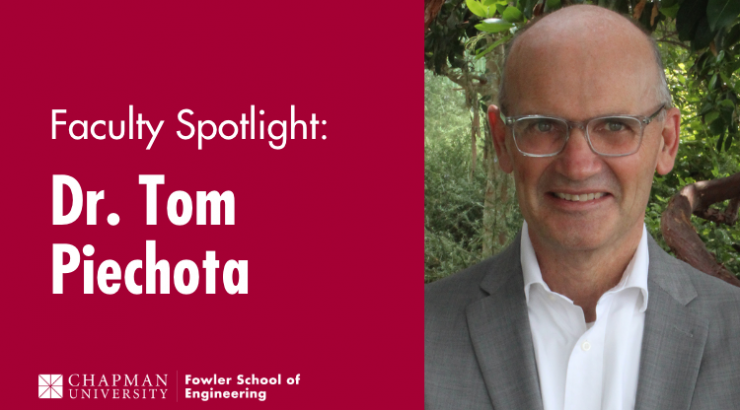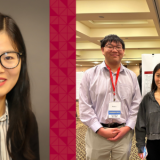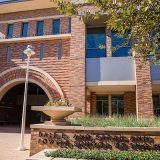
Navigating Visions of Fowler’s Future: Meet the School of Engineering’s Interim Dean Faculty Spotlight: Dr. Thomas C. Piechota
June 2, 2023
Faculty Name: Dr. Thomas “Tom” Piechota
Course(s) Taught: FFC 100B: Grand Challenges in Science and Engineering, ENGR 101: Foundations of Design and Fabrication, CPSC 370: Data Science for Sustainability in the Environment, ENV 420: Environmental Hydrology
Current Research: Water resources, hydrology, climate change, and remote sensing
As the 2022-23 school year comes to a close, the Fowler School of Engineering (FSE) enters a transitional period of progress that will shape the futures of FSE students, faculty, alumni, and more. This upcoming fall, Dr. Thomas “Tom” Piechota will spearhead this effort by serving as the Interim Dean of Fowler Engineering, ushering in the school’s newest phase of growth and guiding the incoming Class of 2027.
Piechota joined the Chapman University community in 2016 as the Vice President for Research, demonstrating a deep-rooted commitment to academic scholarship. Since then, he has taken on a plethora of faculty positions across campus, splitting his appointment between both Fowler and Schmid College of Science and Technology.
Our team spoke with Piechota to learn more about his six years on Chapman’s campus, gaining valuable insight into how his experiences among various research, administrative, and classroom communities have helped him envision Fowler’s next steps forward.

From May 22nd to June 4th, 2022, Piechota and his family went on a “Water Road Trip.” This involved visiting important water locations (such as the Hoover Dam, as shown above), speaking with experts about water and climate futures, and gathering materials for his course in environmental hydrology.
Q&A With Dr. Tom Piechota
Q: What have you enjoyed most about teaching at Fowler?
Piechota: What I enjoy most about being a professor is working with students. In the fall, I had the pleasure of teaching our freshmen students in our Grand Challenges Initiative class, which is essentially our First-Year Foundations (FFC) course. It’s cool to be able to have freshmen in their first class at Chapman and get them excited about science and engineering within the context of grand challenges. They also learn critical skills that set them up for success: critical thinking, communication, and working in teams. It’s also fun to see where those same students end up and how they grow in their careers.
I also have students who do research with me. It’s fun to see them get into research and topics that are relevant to our society. My work focuses on water and climate, which are big issues around here in California and the West—this year, we had one of the wettest years on record—so students can relate to that. I’ve been working in academia for 24 years now and one of the most rewarding parts is seeing students eager to apply knowledge to areas they know.
Q: How has your previous industry knowledge and research shaped your teaching?
Piechota: When I first graduated college, I worked in the engineering industry for four years here in Irvine. My background is in civil engineering, working with infrastructure and the built environment—if you had a development or you were building something, the company I worked for prepared a lot of the plans, sites, and other studies that were needed for that plan to happen.
There, I gained useful knowledge about what civil engineers do, how to communicate with clients, and how to work with someone who needs to approve your work. I think this experience helped me as an instructor because I am able to bring that into the classroom. I can take a lot of what I know engineers need to do (particularly in the area of water) and then relate that to my classes. Sometimes it is also very specific with the types of tools being used in the industry; I’ve always tried to ensure I remain up to date.
The research I do also makes me a better teacher because it keeps me aware of the current issues, which I’m able to then share with my students. A lot of the concepts we end up exploring become larger research projects, which makes them more interesting for the class, too. I can show students where the issues are and what data and information is available. Because most of the time students interested in research are hoping to work with you as a professor in your areas of study, this can be a really exciting connection.

In recent weeks, Piechota traveled across Italy to better understand the impact of water and climate on society in cities like Venice and Milan. His ideal class would be a travel course that encourages students to ground themselves within tangible environmental topics affecting Italy.
Q: What has most impressed you about the Fowler community?
Piechota: The approach being used at Fowler is a non-traditional one: we make a point to get students involved in hands-on, project-based learning right away when they’re freshmen, which isn’t always the case in university engineering programs. More commonly, students have to wait until they’re seniors to engage with more fun projects, but we want students to begin by innovating and learning from any failures they may have. That’s part of life: you’re never always going to be successful but you will learn a great deal, and I think that’s perfect for Fowler.
Our students have embraced that idea: they are willing to come up with cool, interesting, and maybe sometimes crazy things. I’m impressed by that culture among our students to think creatively. When I was watching the Make-a-Thon projects, one student had this fantastic idea that involved a hugging bear with a sensor. It was a great project because not only was there a technical aspect to their work, but there was also a social aspect. Fowler students recognize the power of human-centered design; it’s necessary for engineers to see that everything they do will impact human beings, so being understanding and sympathetic to humans is important.
Q: What advice do you have for FSE students?
Piechota: First, make sure you get to know your classmates—work with them and lift each other up. It’s important that students find ways to support one another. Study together, go out together, find ways to bond.
Second, get to know your professors as well. Chapman is fantastic because it’s a smaller campus where every student has a chance to get to know their professors; students at bigger schools don’t necessarily have that same opportunity.
Lastly, don’t be scared to fail—you learn a lot when you experience challenges. Whether a project, an experiment, or a design didn’t quite go right, how do you learn from that? The idea is that your work gets better each time because you’re learning from your mistakes.
Q: What are you most looking forward to as Interim Dean?
Piechota: Dean Lyon and the faculty have done a great job setting the school on a good path by designing a culture where students look forward to doing interesting things and faculty are excited about their programs. It’s a great environment for work, so allowing that to continue to thrive is one of the things I’m looking forward to.
I’m also thrilled that Fowler will be moving into another phase in the fall because the graduate program will be starting. It’s fantastic to see us evolve from primarily being focused on undergraduate work to now having a cohort of graduate students. Graduate programs help elevate the research profile of the school as well, and we also have faculty doing interesting research and earning grants from places like the National Science Foundation, so it will be wonderful to see that growth.
Q: Where can we find you when you are not in Swenson or Keck?
Piechota: On campus, I love eating in the Randall Dining Commons—I go over there once in a while to eat because they have a good selection of food. You also tend to run into students there, so periodically you’ll see me there eating lunch with graduate students and postdocs. The other place you might find me at is the beautiful Sandi Simon Center for Dance because one of my daughters is a dance major here at Chapman. I spend a lot of time watching dance competitions and performances there and at the Musco Center for the Arts. They’re wonderful facilities and I really appreciate the art of dancing.
Off-campus, I have also been very active over the last three years on mission trips to places like Ensenada and Poland with my two daughters and other people through our church.
For more information about Dr. Piechota’s research and extensive publication history, visit his Chapman faculty profile, Google Scholar page, and personal research website.

